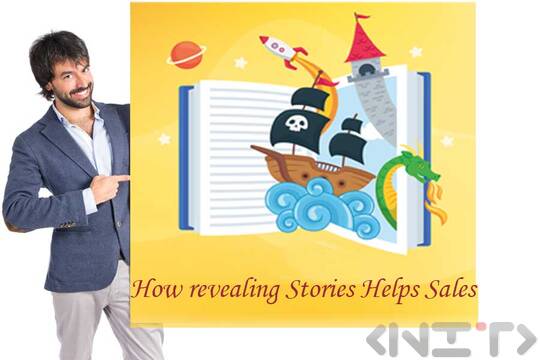
Approximate reading time: 2m 50s
How Revealing Emotional Stories Helps Sales
Experienced professionals know that telling pleasant stories can help a lot in the sales process. This technique can be used in any sales: real estate sales, car sales, home sales, services, and even consulting and software services. It is often used to attract and persuade potential customers. But why is this happening and what is behind this fact? How can a story be so compelling?
According to scientific research, a well-told story affects both the brain and body chemistry of potential buyers, setting them in the appropriate mood to shop with us.
Two psychology professors at Ohio State University conducted an experiment that looked at how storytelling can change beliefs and tip the scales in favor of the salesperson.
The scientists told some very emotional stories to a group of volunteers. One of them was for physically assaulting a man in a large shopping center. They then had the volunteers answer test questions. Questions aimed at finding out how much the audience was attracted to the story, and how much the story influenced their beliefs. So, did these pictures convince the people of the experiment that shopping malls are unsafe?
Scientists have found a strong link between the "transfer" to the world of stories and changes in people's beliefs and attitudes. In other words the "good story" turned out to be a very effective way to change people's minds.
But what is the story that can affect people? According to scientists, the main thing in it is two things: bright characters and interesting situations in which they are located. Almost everyone has impressions of shopping centers and shopping in one of them, so each of the participants could identify themselves with the attack and experience it personally.
The researchers found that it doesn't matter if the stories are true or not. Some of the volunteers were told that the stories were fictional, while others were told the truth. In both cases, the reactions were largely the same.
So why, then, do good, engaging stories have such a strong influence on our minds? This is because they have a powerful effect on our bodies. This idea was the result of the work of Paul Zack, a leading neuroeconomist at Claremont University, California.
Emotions and chemistry in our body
Zack conducted a series of experiments in which participants watched two types of videos. One had dramatic scratches and emotional impact. The video shows a father whose son is playing in the background while the father speaks in front of the camera. We learn that the son is seriously ill....
Another clip presents almost the same information, but in a more neutral tone. A boy and his father at the zoo. The video mentions the illness and that the child is not well.
After watching the videos of all the participants, blood tests were performed, and the researchers found that more emotional clips caused a spike in oxytocin, a confidence hormone that facilitates social connections and creates a sense of intimacy.
Emotionally neutral clips did not significantly affect oxytocin levels, although they essentially conveyed the same information.
Three key elements
Obviously, these experiments are very important for sales. No matter what you're trying to convince the buyer, here are 3 things you can do to create emotional stories that will affect the buyers.
Relativity
Enter a character and situation that listeners can contact or identify with.
If your customer is, say, an old and experienced IT professional, think about what problems the customer or their organization is facing. Perhaps it's about staff turnover, struggling with new technologies, or worrying about the progress of current projects. Then tell a story about a former customer in a similar position who was helped by your product offer.
Raise the stakes.
Make a story about something with potentially serious consequences-a company facing big cuts, a manager squeezed by a tight budget, an employee struggling to keep their skills fit for a changing work environment.
Use emotional language.
Paul Zack's experiments show that passionate language makes you more persuasive. So, for example, when you try to influence the decision-maker, don't just talk about your product. Talk about keeping key players on your prospect's team to gain an edge over industry competitors or avoid feeling frustrated when teams miss deadlines.
The best thing about all this is that you don't have to be a native storyteller who knows how to win over an audience with words. If you simply learn to put the three key ingredients-relativity, high stakes, and emotion - into your stories, you can create a sense of identification with the story and influence the behavior of your customers.